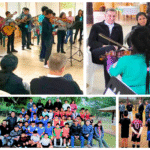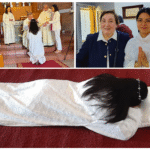By F. Luis Casasus, General Superior of idente missionaries
Commentary on the Sunday Gospel of 22-10-2017, Twenty-nintth Sunday in Ordinary Time (Book of Isaiah 45:1.4-6; 1Thessalonians 1:1-5b; Saint Matthew 22:15-21)
When Christ speaks about giving to God and giving to Cesar, he is not talking about the “separation of church and state.” He wanted to go beyond mere human politics. Jesus makes a clear distinction (not an opposition) about what pertains to religious belief and what is simply belonging to secular culture or moral.
This is always a challenge in every age. It is our personal challenge also. Probably, many times we focus our efforts in the fulfillment of obligations like doing an honest and hard work, non-discrimination, loyalty, being nice to people, etc. But it is not necessary to follow Jesus in order to fulfill certain minimum social or moral requirements. If you have secular obligations and if they are just, then you fulfill them as an honorable citizen, but your “heart, soul and mind” belong not to the state, nor to your job or your favorite pastime. You belong to Christ; and Christ belongs to God (1 Corinthians 3:23).
Saint Ignatius of Loyola discovered this after being wounded in the Battle of Pamplona in 1521. While in recovery, he was inspired to abandon his military life and devote himself to labor for God. In his spiritual exercises, he included a prayer that the Jesuits still use to this day when they take their vows: Receive, O Lord, all my liberty. Take my memory, my understanding, and my entire will. Whatsoever I have or hold, You have given me; I give it all back to You and surrender it wholly to be governed by your will. Give me only your love and your grace, and I am rich enough and ask for nothing more (Spiritual Exercises, #234).
Our father Founder expressed it with the Spirit of the Gospel: in fact, everything, each of our moments, each of our thoughts and desires, each of our actions, should belong to God. When I have different intentions or motivations (morally good or not) I am not able to give to God what belongs to Him. This is also the message of today’s first reading: I am the Lord, there is no other.
Beyond being involved in the affairs of this world, including religious and apostolic activities, however, Jesus tells us to give to God what belongs to God. All the affairs of this world are passing. As much as we worry about the economy, wars and all of the problems of our world, in the end all of these things are inconsequential. Yes, it is very important to be active in our world, and to be responsible for that which has been entrusted to our care. Yet, everything in the end has come from God and we return to God all that He has given us, especially the mission of caring for our neighbors. Otherwise, we shall have to say with the poet:
For all the good I have not done…
Forgive me, forgive me (Katharine Towers).
Even Caesar belongs to God, because he (like Cyrus) is called by God to reveal His plan of salvation in ways unknown to him. They are, and we are instruments of God. Even when we rebel directly against Him, He is able creatively to include our rebellion in His plan and leave us with the possibility of a new good.
But this is good news; we must feel humble and be grateful for the blessings that God has given to us so that we can use them for His divine plan. St Paul makes it clear that this God who is Father must be manifested in the way we live our lives. He reminded the Thessalonians that they must show their faith in action, worked for love and preserved through hope in our Lord Jesus Christ.
The kingdom of Heavens kingdom encompasses every dimension of life. This kingdom can only be realized when everything comes under the rule of God, the rule of the values of the Gospel. This is not a possibility among others. This is the law: only a completely dedicated life, with complete detachment, can proclaim that God lives in us and we in Him. In this way, when we do not live a dual life, a life of faith and our mundane life, God gives us souls and the necessary inspiration to bring these souls to Him.
One of the simplest and more subtle examples of the risk of confining ourselves to a secular morality is our use of time.
Being a good steward of the time God gives is not really a matter guarding the minutes so we can spend our time productively. The goal concerning the stewardship of time is not to get Christians busier. It is not busier lives that we need. What is needed instead is a better use of the time we have combined with a spiritual and apostolic view of time.
Yes, we are children of God and citizens of heaven who are exiles, pilgrims. The world, on the other hand, lives as earth dwellers who search for their meaning and purpose in life from this world alone. For the disciple of Christ, Paul reminds that we live in a time of darkness or night and as an evil age, the form of which is passing away. Everything in this world is designed to get us to make life in this world our ultimate aim. But we are here expected to be ambassadors of Christ called to a world-wide mission of making disciples of all nations: So whether you eat or drink, or whatever you do, do everything for the glory of God (1Corinthians 10: 31).
However, at a second thought, without God there is no basis for morality at all, since everything is relative. Without God, there cannot be any total surrender to anything because it would mean surrender to nothing.
If faith cannot give meaning to our entire life, then we can be certain that we are worshipping a false image of God. Some carve out a ‘do-it-yourself’ faith that reduces God to the limited space of their own desires and their own convictions. Others reduce God to a false idol; using his holy name to justify their own interests or even to incite hatred and violence (Pope Francis).
C.S. Lewis once wrote:
There are three images in my mind which I must continually forsake and replace by better ones: the false image of God, the false image of my neighbors, and the false image of myself.
Sometimes, conflicts can arise between the laws of humanity and God’s commands. Then, it may be helpful to recall the story of St. Thomas More, the English martyr.
King Henry VIII of England is validly married. He appeals to Rome to annul the marriage. But there is no honest basis for annulment. Rome refuses. Henry declares himself Head of the Church in England and remarries. He then orders his friends and officials to sign a document declaring that they agree he acted rightly in the matter. Many of More’s friends sign, but More refuses. Henry demands that he sign or face arrest, trial for treason, and execution by the state. More refuses.
He had two obligations, one to God and one to his country. When they conflicted, More had no choice but to remain faithful to his obligation to God. On his way to public execution in 1534, More encouraged the people to remain steadfast in the faith. His last recorded words were: I die the King’s good servant, but God’s first.
Today’s Gospel reminds us that we are citizens of the world and citizens of Heaven. We have an allegiance and an obligation to each. We hope the obligations will never clash. But if they ever do, we must resolve them as Thomas More did, without compromise to our God or to our conscience.
An essential challenge of the readings today is to keep our eyes open to the permanent act of the Holy Spirit, to be aware that we can make secular things into idols and that we are called to be purified and ever more closely united to Him.
He invites us to become more aware of the workings of God in all of our life and the events of our life. We should never narrow our vision simply to that which is seen as holy and of God by our society or by our friends. God transcends all. God is present in all. This awareness is called Inspiration and, as an element of our mystical life, should be continuous, and indeed it is, when we open our doors to the divine persons. Becoming convinced of God’s presence and His action in the world is at the heart of our faith, no matter how weak it may be.











